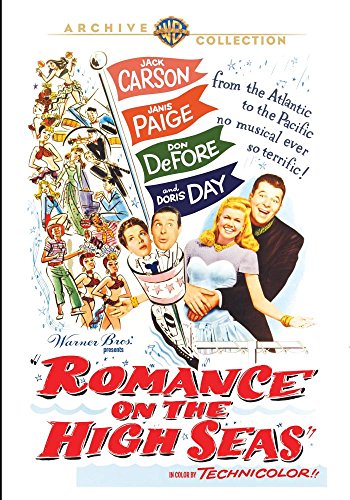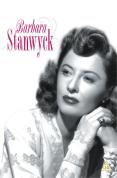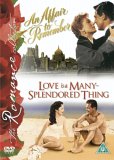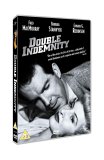![Citizen Kane [1941]](/pictures/1012116.jpg) Citizen Kane | DVD | (05/01/2004)
from £6.54
| Saving you £3.45 (52.75%)
| RRP
Citizen Kane | DVD | (05/01/2004)
from £6.54
| Saving you £3.45 (52.75%)
| RRP In the May of 1941 RKO radio Pictures released a controversial film by a 25 year-old first-time director. That premiere of Orson Welles' Citizen Kane was to have a profound and lasting effect on the art of motion pictures. It has been hailed as the best American film ever made and it's as powerful film today as it was fifty years ago. It earned eight Academy Award nominations and won the Oscar for Best Screenplay. Through its unique jigsaw-puzzle story-line inventive cinematograp
![For Whom The Bell Tolls [1943]](/pictures/1012160.jpg) For Whom The Bell Tolls | DVD | (10/11/2003)
from £5.85
| Saving you £4.14 (70.77%)
| RRP
For Whom The Bell Tolls | DVD | (10/11/2003)
from £5.85
| Saving you £4.14 (70.77%)
| RRP Based on the best-selling controversial novel by Pulitzer and Nobel Prize-winning author Ernest Hemingway 'For Whom the Bell Tolls' graces the screen with legendary stars Gary Cooper and Ingrid Bergman. The story follows expatriate American demolition expert Robert Jordan who aides anti-fascist freedom fighters of Spain. Assisting him is a band of warriors including the strong-willed Pilar (Katina Paxinou in an Oscar winning performance) the dangerously undependable Pablo and th
![Citizen Kane : Special Edition [1941]](/pictures/1012388.jpg) Citizen Kane : Special Edition | DVD | (21/07/2003)
from £11.99
| Saving you £-4.00 (N/A%)
| RRP
Citizen Kane : Special Edition | DVD | (21/07/2003)
from £11.99
| Saving you £-4.00 (N/A%)
| RRP The most acclaimed film in cinema history, Citizen Kane receives extra bolstering each time it tops a "greatest films ever" list. As a piece of filmmaking it ticks all the right boxes: a precociously talented director and lead actor in Orson Welles, Gregg Toland's innovative cinematography, a strong screenplay by Welles and Herman J Mankiewicz, rich scoring from Bernard Herrmann, and so on. For its time, it was technically groundbreaking, and laid out a blueprint for Hollywood filmmaking that's still influential. But, most importantly, as a viewing experience it's still one of the most mesmerising and beautiful films in existence. From its opening scenes--Kane's eerie Gothic mansion, his lone figure muttering the word "Rosebud" as he dies, journalists discussing the newsreel footage of his obituary--Kane lays out an enigma: who exactly was this man? Looping flashbacks build up a portrait of a contradictory figure who, despite living in the public eye, remained a mystery at heart. A testament to the corrupting influence of money, fame and the media and at its centre the tale of a man in search of love, Citizen Kane is a personal tragedy on an epic scale. Technically, it's a lesson in filmmaking in itself whose daring aesthetics nonetheless remain unobtrusive. It's doubtful that a debut director will ever be given such free reign by a studio again and even if this happened, it's doubtful that such a masterpiece would be created. On the DVD: Citizen Kane in this DVD special edition is beautifully remastered and comes with a feature illustrating the before and after of the restoration process. A 50-minute documentary, "Anatomy of a Classic", hosted by Barry Norman, delves into the making of the film as well as trying to deal with some of the myths that surround it, like the (untrue) rumour that Welles ran over both time and budget. Film historian Ken Barnes takes over for a commentary and Welles himself is featured in his controversial 1938 radio broadcast of The War of the Worlds and 1945 broadcast of The Happy Prince. A photo gallery, extensive cast and crew profiles, breakdown of all the films expenses and trailer round off this admirable package.--Laura Bushell
![Kiss Me Deadly [1955]](/pictures/1012375.jpg) Kiss Me Deadly | DVD | (04/08/2003)
from £12.99
| Saving you £N/A (N/A%)
| RRP
Kiss Me Deadly | DVD | (04/08/2003)
from £12.99
| Saving you £N/A (N/A%)
| RRP A terrific film noir full of skewed camera angles and mysterious whose-shoes-are-those shots, Kiss Me Deadly is about as dark and exciting as noir gets. A young woman (Cloris Leachman) in bare feet and a trench coat throws herself into the traffic to flag down help and the car she stops belongs to detective Mike Hammer. Not even 15 minutes into the film and there's already been a murder, a mysterious letter, an attempt to kill Hammer and, of course, a warning to stay out of it. Hammer, tired of lowlife divorce cases, smells something big and can't let it go. Mike Hammer is a detective so cool he can win a fight with nothing more than a box of popcorn as a weapon; he knows his opera singers as well as his amateur prize-fighters and he makes the ladies swoon--but he's far from a conventional hero. In fact, he's emphatically not a nice guy; Hammer happily whores out his secretary-girlfriend Velma to cinch up those divorce cases and has a penchant for slamming other people's fingers in drawers. Even the bad guys know he's a sleazebag ("What's it worth to you to turn your considerable talents back to the gutter you crawled out of?"). Ralph Meeker plays Hammer's ambivalence brilliantly, swinging easily between sexy and just plain mean. --Ali Davis
![Double Indemnity [Masters of Cinema] (Blu-ray)](/pictures/1113973.jpg) Double Indemnity | Blu Ray | (25/06/2012)
from £17.25
| Saving you £4.00 (25.02%)
| RRP
Double Indemnity | Blu Ray | (25/06/2012)
from £17.25
| Saving you £4.00 (25.02%)
| RRP Director Billy Wilder (Sunset Boulevard) and writer Raymond Chandler (The Big Sleep) adapted James M. Cain's hard-boiled novel into this wildly thrilling story of insurance man Walter Neff (Fred MacMurray), who schemes the perfect murder with the beautiful dame Phyllis Dietrichson (Barbara Stanwyck: kill Dietrichson's husband and make off with the insurance money. But, of course, in these plots things never quite go as planned, and Barton Keyes (Edward G. Robinson) is the wily insurance investigator who must sort things out. From the opening scene you know Neff is doomed, as the story is told in flashback; yet, to the film's credit, this doesn't diminish any of the tension of the movie. This early film noir flick is wonderfully campy by today's standards, and the dialogue is snappy ("I thought you were smarter than the rest, Walter. But I was wrong. You're not smarter, just a little taller"), filled with lots of "dame"s and "baby"s. Stanwyck is the ultimate femme fatale, and MacMurray, despite a career largely defined by roles as a softy (notably in the TV series My Three Sons and the movie The Shaggy Dog), is convincingly cast against type as the hapless, love-struck sap. --Jenny Brown
![An Affair To Remember [1957]](/pictures/1012877.jpg) An Affair To Remember | DVD | (18/02/2002)
from £N/A
| Saving you £N/A (N/A%)
| RRP
An Affair To Remember | DVD | (18/02/2002)
from £N/A
| Saving you £N/A (N/A%)
| RRP Get out your handkerchiefs for this four-star weepie, a 1957 remake of the 1939 Love Affair, directed by Leo McCarey, who also made the original. Grant and Kerr are strangers on an ocean liner, involved with other people, who can't resist each other for a shipboard romance. But they decide to test whether this is the real thing by agreeing to split up, then meeting in six months atop the Empire State Building. Is there anyone who can resist that set-up or the tragic romantic mishap that nearly splits them up? Can you keep dry eyes during the famous finale? Some prefer the original (with Charles Boyer); practically no one liked the underrated 1994 remake with Warren Beatty and Annette Bening. While occasionally a shade slow, this one soars on Grant's charm and Kerr's noble suffering. --Marshall Fine, Amazon.com
 Romance on the High Seas | DVD | (06/06/2017)
from £N/A
| Saving you £N/A (N/A%)
| RRP
Romance on the High Seas | DVD | (06/06/2017)
from £N/A
| Saving you £N/A (N/A%)
| RRP ![Citizen Kane: 80th Anniversary Collectors Edition [4K Ultra HD] [1941] [Blu-ray] [Region Free]](/pictures/1157326.jpg) Citizen Kane: 80th Anniversary Collectors Edition | Blu Ray | (13/12/2021)
from £N/A
| Saving you £N/A (N/A%)
| RRP
Citizen Kane: 80th Anniversary Collectors Edition | Blu Ray | (13/12/2021)
from £N/A
| Saving you £N/A (N/A%)
| RRP Hailed by critics and fans alike as one of the greatest films ever made, Citizen Kane continues to influence filmmakers and astound viewers 80 years later. Nominated for nine 1941 Academy Awards, with a win for Best Original Screenplay, Orson Welles' controversial masterpiece uses innovative flashbacks and ground-breaking cinematography to follow the epic rise and fall of wealthy newspaper magnate. For any fan of films, this is an essential viewing experience. 4k Ultra HD Collector's Edition Includes: Feature Film on 4k and Blu-ray 48-Page Book 20-Page Souvenir Programme Reprint of Press Release Excerpts Two-Sided Poster 5 Collectable Art Cards 3 Photo Stills Special Features on Blu-ray: Separate Commentaries by Roger Ebert and Peter Bogdanovich Interviews with Ruth Warrick and Robert Wise Opening: World Premiere of Citizen Kane Still Photography with Commentary by Roger Ebert and More
![Citizen Kane [1941]](/pictures/1013350.jpg) Citizen Kane | DVD | (20/09/1999)
from £9.99
| Saving you £10.00 (100.10%)
| RRP
Citizen Kane | DVD | (20/09/1999)
from £9.99
| Saving you £10.00 (100.10%)
| RRP Arguably the greatest of American films, Orson Welles' 1941 masterpiece, made when he was only 26, still unfurls like a dream and carries the viewer along the mysterious currents of time and memory to reach a mature (if ambiguous) conclusion: people are the sum of their contradictions and can't be known easily. Welles plays newspaper magnate Charles Foster Kane, taken from his mother as a boy and made the ward of a rich industrialist. The result is that every well-meaning or tyrannical or self-destructive move he makes for the rest of his life appears in some way to be a reaction to that deeply wounding event. Written by Welles and Herman J. Mankiewicz, and photographed by Gregg Toland, the film is the sum of Welles's awesome ambitions as an artist in Hollywood. He pushes the limits of then-available technology to create a true magic show, a visual and aural feast that almost seems to be rising up from a viewer's subconscious. As Kane, Welles even ushers in the influence of Bertolt Brechton film acting. This is truly a one-of-a-kind work, and in many ways is still the most modern of modern films this century. --Tom Keogh
![Monsieur Beaucaire [Blu-ray]](/pictures/1160171.jpg) Monsieur Beaucaire | Blu Ray | (01/02/2022)
from £N/A
| Saving you £N/A (N/A%)
| RRP
Monsieur Beaucaire | Blu Ray | (01/02/2022)
from £N/A
| Saving you £N/A (N/A%)
| RRP ![Whirlpool [1949]](/pictures/1011967.jpg) Whirlpool | DVD | (29/03/2004)
from £20.00
| Saving you £-0.01 (N/A%)
| RRP
Whirlpool | DVD | (29/03/2004)
from £20.00
| Saving you £-0.01 (N/A%)
| RRP The wife of a successful psychoanalyst is arrested for shoplifting and only saved from any scandal by a somewhat dubious hypnotist. Soon finds herself caught up in a murder hunt...
 Barbara Stanwyck | DVD | (13/03/2006)
from £N/A
| Saving you £N/A (N/A%)
| RRP
Barbara Stanwyck | DVD | (13/03/2006)
from £N/A
| Saving you £N/A (N/A%)
| RRP A bumper box set of classic films featuring 'The Queen' Barbara Stanwyck! Double Indemnity (Dir. Billy Wilder 1944): Director Billy Wilder and writer Raymond Chandler ('The Big Sleep') adapted James M. Cain's hard-boiled novel into this wildly thrilling story of insurance man Walter Neff (Fred MacMurray) who schemes the perfect murder with the beautiful dame Phyllis Dietrichson (Barbara Stanwyck): kill Dietrichson's husband and make off with the insurance money. But of cou
![Double Indemnity [Masters of Cinema] (Ltd Edition Blu-ray Steelbook)](/pictures/1113974.jpg) Double Indemnity | Blu Ray | (25/06/2012)
from £49.99
| Saving you £-20.00 (N/A%)
| RRP
Double Indemnity | Blu Ray | (25/06/2012)
from £49.99
| Saving you £-20.00 (N/A%)
| RRP Director Billy Wilder (Sunset Boulevard) and writer Raymond Chandler (The Big Sleep) adapted James M. Cain's hard-boiled novel into this wildly thrilling story of insurance man Walter Neff (Fred MacMurray), who schemes the perfect murder with the beautiful dame Phyllis Dietrichson (Barbara Stanwyck: kill Dietrichson's husband and make off with the insurance money. But, of course, in these plots things never quite go as planned, and Barton Keyes (Edward G. Robinson) is the wily insurance investigator who must sort things out. From the opening scene you know Neff is doomed, as the story is told in flashback; yet, to the film's credit, this doesn't diminish any of the tension of the movie. This early film noir flick is wonderfully campy by today's standards, and the dialogue is snappy ("I thought you were smarter than the rest, Walter. But I was wrong. You're not smarter, just a little taller"), filled with lots of "dame"s and "baby"s. Stanwyck is the ultimate femme fatale, and MacMurray, despite a career largely defined by roles as a softy (notably in the TV series My Three Sons and the movie The Shaggy Dog), is convincingly cast against type as the hapless, love-struck sap. --Jenny Brown
![Double Indemnity (1944) (Criterion Collection) UK Only [Blu-ray] [2022]](/pictures/1159180.jpg) Double Indemnity (1944) (Criterion Collection) UK Only | Blu Ray | (30/05/2022)
from £32.98
| Saving you £N/A (N/A%)
| RRP
Double Indemnity (1944) (Criterion Collection) UK Only | Blu Ray | (30/05/2022)
from £32.98
| Saving you £N/A (N/A%)
| RRP Has dialogue ever been more perfectly hard-boiled? Has a femme fatale ever been as deliciously evil as BARBARA STANWYCK (The Lady Eve)? And has 1940s Los Angeles ever looked so seductively sordid? Working with cowriter RAYMOND CHANDLER, director BILLY WILDER (Ace in the Hole) launched himself onto the Hollywood A-list with this paragon of film-noir fatalism from JAMES M. CAIN's pulp novel. When slick salesman Walter Neff (The Caine Mutiny's FRED MACMURRAY) walks into the swank home of dissatisfied housewife Phyllis Dietrichson (Stanwyck), he intends to sell her insurance, but he winds up becoming entangled with her in a far more sinister way. Featuring scene-stealing supporting work from EDWARD G. ROBINSON and the chiaroscuro of cinematographer JOHN F. SEITZ (Sunset Blvd.), Double Indemnity is one of the most wickedly perverse stories ever told and the cynical standard by which all noir must be measured. Product Features New 4K digital restoration, with uncompressed monaural soundtrack Audio commentary featuring film critic Richard Schickel New interview with film scholar Noah Isenberg, editor of Billy Wilder on Assignment New conversation between film historians Eddie Muller and Imogen Sara Smith Billy, How Did You Do It?, a 1992 film by Volker Schlöndorff and Gisela Grischow featuring interviews with director Billy Wilder Shadows of Suspense, a 2006 documentary on the making of Double Indemnity Audio excerpts from 1971 and 1972 interviews with cinematographer John F. Seitz Radio adaptations from 1945 and 1950 Trailer English subtitles for the deaf and hard of hearing
![Citizen Kane [1941]](/pictures/1039179.jpg) Citizen Kane | DVD | (29/05/2006)
from £12.26
| Saving you £7.73 (63.05%)
| RRP
Citizen Kane | DVD | (29/05/2006)
from £12.26
| Saving you £7.73 (63.05%)
| RRP In May of 1941 RKO Radio Pictures released a controversial film by a 25-year-old first-time director. That premier of Orson Welles' Citizen Kane was to have a profound and lasting effect of the art of motion pictures. It has been hailed as the best American film ever made and it's as powerful a film today as it was fifty years ago. It earned eight Academy Award nominations and won the Oscar for Best Screenplay. Through its unique jigsaw-puzzle storyline inventive cinemato
![Citizen Kane [1941]](/pictures/1012123.jpg) Citizen Kane | DVD | (08/12/2003)
from £N/A
| Saving you £N/A (N/A%)
| RRP
Citizen Kane | DVD | (08/12/2003)
from £N/A
| Saving you £N/A (N/A%)
| RRP In May of 1941 RKO Radio Pictures released a controversial film by a 25-year-old first-time director. That premier of Orson Welles' 'Citizen Kane' was to have a profound and lasting effect of the art of motion pictures. It has been hailed as the best American film ever made and it's as powerful a film today as it was fifty years ago. It earned eight Academy Award nominations and won the Oscar for Best Screenplay. Through its unique jigsaw-puzzle storyline inventive cinematography brilliant ensemble acting and direction by Welles the story of Charles Foster Kane is a fascinating portrait of America's love of power and materialism and the corruption it sometimes fosters. Like all great films Citizen Kane is a memorable fusion of cinematic art and marvellous entertainment.
![Whirlpool [VHS] [1949]](/pictures/1095255.jpg) Whirlpool | DVD | (29/03/2004)
from £N/A
| Saving you £N/A (N/A%)
| RRP
Whirlpool | DVD | (29/03/2004)
from £N/A
| Saving you £N/A (N/A%)
| RRP  Affair To Remember, An / Love Is A Many Splendored Thing | DVD | (31/01/2005)
from £19.99
| Saving you £-4.00 (N/A%)
| RRP
Affair To Remember, An / Love Is A Many Splendored Thing | DVD | (31/01/2005)
from £19.99
| Saving you £-4.00 (N/A%)
| RRP An Affair To Remember:In this poignant and humorous love story nominated for four Academy Awards Cary Grant and Deborah Kerr meet on an ocean liner and fall deeply in love. Though each is engaged to someone else they agree to meet six months later if they still feel the same way about each other. But a tragic accident prevents their rendezvous and the lovers' future takes an emotional and uncertain turn. Love Is A Many Splendoured Thing: Set in Hong Kong at the time
 Double Indemnity | DVD | (11/07/2005)
from £10.19
| Saving you £-0.20 (N/A%)
| RRP
Double Indemnity | DVD | (11/07/2005)
from £10.19
| Saving you £-0.20 (N/A%)
| RRP Director Billy Wilder and writer Raymond Chandler adapted James M. Cain's hard-boiled novel into this wildly thrilling story of insurance man Walter Neff (Fred MacMurray), who schemes the perfect murder with the beautiful dame Phyllis Dietrichson (Barbara Stanwyck): kill Dietrichson's husband and make off with the insurance money. But, of course, in these plots things never quite go as planned, and Barton Keyes (Edward G. Robinson) is the wily insurance investigator who must sort things out. From the opening scene you know Neff is doomed, as the story is told in flashback; yet, to the film's credit, this doesn't diminish any of the tension of the movie. This early film noir flick is wonderfully campy by today's standards, and the dialogue is snappy ("I thought you were smarter than the rest, Walter. But I was wrong. You're not smarter, just a little taller"), filled with lots of "dame"s and "baby"s. Stanwyck is the ultimate femme fatale, and MacMurray, despite a career largely defined by roles as a softy, is convincingly cast against type as the hapless, love-struck sap. --Jenny Brown, Amazon.com

Please wait. Loading...
This site uses cookies.
More details in our privacy policy